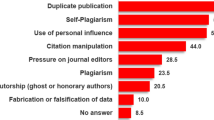Abstract
Academic researchers in business are likely to have different perceptions and attitudes regarding what constitute unethical behavior in conducting their research. In fact, some might consider certain actions to be totally ethical while other behaviors might be unacceptable in one discipline, but acceptable in another. Therefore, a survey was administered to a sample of professors at AACSB-accredited institutions to identify those actions felt to be unethical and to gauge the state of research ethics among business academics. The survey was developed around eleven substantive issues concerning business research ethics. Some of the topics included: treatment of data, confidentiality, plagiarism, working with co-authors, and multiple submissions. First, respondents were asked whether they felt the behavior was unethical. Secondly, they were asked whether they had ever personally engaged in such activity. Finally, they were asked if they were aware of colleagues who had taken a particular action.
The primary contribution of the paper is to provide evidence on faculty definitions of unethical research practices and the extent of such behavior within the academic business environment. An overwhelming percentage of respondents (greater than 95%) condemned five of the eleven activities studied. They included: falsifying data, violating confidentiality of a client, ignoring contrary data, plagiarism, and failing to give credit to co-authors. Probably the most important finding of this paper concerns the level of unethical activity reported by faculty about their colleagues. While these findings likely include some degree of double counting within an institution, the level of unethical activity reported on colleagues and the number of institutions represented indicates the problem is quite common. Seven actions were reported by between 20 and 47% of respondents to have occurred within their institutions. These actions include adding names of persons not contributing to a paper, failing to give credit to co-authors, selective reporting of data, and plagiarism. These results indicate unethical practices occur frequently among researchers in AACSB accredited business schools and are not merely exceptions. Coverage of ethical issues in a graduate research methods course might force students to ponder these issues prior to confronting them in the world of business or academic research.
Similar content being viewed by others
REFERENCES
Broad, W. J. and N. Wade: 1982, Betrayers of the Truth, Simon & Schuster, New York.
Chubin, D. E.: ‘Research Malpractice’, BioScience 35(2).
Colt, G. H.: 1983, ‘Too Good To Be True’, Harvard Magazine, July–August.
Hasselback, J. R.: 1995, Guide to Accounting Faculty, Prentice Hall, New York.
Hasselback, J. R.: 1996, Guide to Economics Faculty, Prentice Hall, New York.
Hasselback, J. R.: 1995–1996, Directory of Management Faculty, McGraw Hill, New York.
Zikmund, W. G.: 1997, Business Research Methods, 5th edition, Dryden Press, Fort Worth.
Author information
Authors and Affiliations
Rights and permissions
About this article
Cite this article
Dotterweich, D.P., Garrison, S. Research Ethics of Business Academic Researchers at AACSB Institutions. Teaching Business Ethics 1, 431–447 (1997). https://doi.org/10.1023/A:1009709519476
Issue Date:
DOI: https://doi.org/10.1023/A:1009709519476




